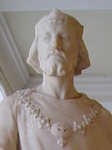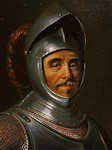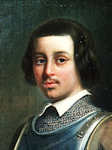Descent from an ancient Welsh (Cambrian) King CADWALLADER [King Cadwaladr (678)] has been claimed by the Blayney family through the line of Brochwel Ysgrithog, Prince of Powys [445] and also by the supposedly unrelated Keynsham (near Bristol) and Evesham (in Worcester) branches in England. For some time I was unable to confirm this claim [see here], not even being sure which King Cadwallader (see below) or if it in fact referred to the "direct line from CADWALLADER, a younger son of the Prince of Wales" {Lodge's "Peerage of Ireland" [707]}.
That Cadwallader mentioned by Lodge is probably "Rotpert alias Cadwaladr", a younger son of Owain Gwynedd, of Gwenedd (aka King of Wales). This Robert was the father of Dyddgu, who married Meilir "Gryg" ap Gruffudd, ancestor of the Blayneys. However, he was really "ancient", not a king and not a particularly prominent individual from which to claim descent.
However, we have already shown that the King CADWALLADER from whom the Blayneys descend indirectly (ie not a direct patrilineal line) was Cadwaladr Fendigaid (the Blessed) and Kevin McKenzie [145] agrees it was this Cadwaladr from whom a number of prominent welsh gentry families (including the Blayneys) claimed descent.
There were three possible candidates for this Cadwallader, King of Cambia,
- Cadwaladr ap Meirchion, King of Meirionydd (born c.460) [A possible King Arthur but no direct Blayney link].
- St Cadwaladr Fendigaid ap Cadwallon, King of Gwynedd (b~603 d.664) [A known (indirect) Blayney ancestor].
See descent from Cadwallader to Meilir Gryg and then Meilir Gryg to Blayneys.- Cadwaladr (Cadwalader) of Caerdigan, (b~1096-1172), co-ruler of Gwynedd/Wales [not an ancestor but with some Blayney links].
Although evidence now points to Cadwaladr Fendigaid (the Blessed) as the "King Cadwaladr" from which prominent welsh gentry families (including the Blayneys) claimed descent [145], the other two make for some interesting reading so I will leave the information about them here for the time being, but in grey.
Cadwalladr 1
Cadwaladr, King of Meirionydd (born c.460 or 475)
(Latin-Catuvelladurus, English-Cadwallader)The Kings of Meirionydd,
THE HOUSE OF CUNEDDA [1a]
Meirchion Meirionydd, King of Meirionydd (Latin-Marcianus, English-Mark) [1b]
Meirchion was the son of Cunedda Wledig's eldest boy, Typipion who had died some years prior to Cunedda's migration south from Manau Gododdin, so it was left to Meirchion to take his father's place in fighting the invading Irish. He killed their leader, Beli mac Benlli Gawr (the Giant), and drove them from North Wales. As a reward, his grandfather handed over to him the area that became known as Meirionydd in his honour. Meirchion ruled wisely for many years and had three sons: Cadwaladr, Cadwallon & Bleiddud. The dynasty continued under the shadow of Gwynedd for several centuries:Cadwaladr, King of Meirionydd (Latin-Catuvelladurus, English-Cadwallader) [1]
Nothing is known of King Meirchion's son, Cadwaladr, but he was a contemporary of King Arthur, living in the late 5th century. August Hunt [11] theorizes that the two are identical since Cadwaladr means "Battle-Leader," a name possibly rendered into Latin as the title used by Nennius for Arthur, Dux Bellorum. [1c]. He died fighting an unidentified chieftain named Medraut [13a]. See KingArthur.htmlGwrin Farfdrwch ap Cadwaladr, King of Meirionydd b~480 (Latin-Corinius, English-Corin) [1d] [13a]
Gwrin Cut-Beard was Cadwaladr's son. He presumably wore a neatly trimmed beard. Geoffrey of Monmouth transfers him back in time to become one of his more legendary Kings, Gurguit Barbtruc. If his stories relate to the historical figure, then Gwrin led a successful campaign against "the Danes" (presumably Saxon raiders). He married Princess Marchell, daughter of King Brychan Brycheiniog and Marchell verch Brychan in the early 6th century (before 520). [1e] [13b] Gwrin was supposed to have been buried in Caer-Legeion-guar-Uisc [1f]So is King Cadwalladr of Meirionydd actually King Arthur??
Quite possibly, so lets look at the history (as opposed to the myth) of Arthur and then the history of these kings:- see King Arthur.Is the King Cadwallader of Cambria in the Blayney claim this King Cadwalladr of Meirionydd??
Well, King Cadwallader b~460 was the father of King Gwrin Farfdrwch b~480, father of King Gwyddno "Long-Shanks" Garahnhir b~520 [best known for the loss of a major section of low lying Meirionydd to the Atlantic Ocean]. Gwyddno married Ystradwen and had sons named Idris, Rhun, Dyfnwal, Eifionydd, Elffin, Sandde and Edern. King Idris Gawr "the Giant" (b.560-632), King of Meirionydd (Latin: Idrus; English: Ider), father of King Swalda (Sualda) b.595, father of King Brochfael (b.625-662), father of Einudd Bach "the Short" b~655, father of Ednyfed b~685 , father of Brochfael b~715, father of Cynan b~745, but the line of descent apparently ends with Cynan about 785, so Meirionydd is fully merged back into Gwynedd. I can find no genealogy connecting King Cadwalladr of Meirionydd to a Blayney ancestor.and now jump ahead to a century after Arthur's death and one again finds another Cadwallader
Cadwalladr 2
St. Cadwaladr Fendigaid, King of Gwynedd (c.630-664/8)
(Latin, Catuvelladurus/English, Cadwallader)633 The British, under King Cadwallon of Gwynedd, meet the Northumbrians in the Battle of Hatfield Chase. King Edwin of Deira is killed in the fighting and Cadwallon is victorious. Cadwallon is later besieged at York by Edwin's cousin and successor, Osric. The former is again victorious.
634 King Cadwallon of Gwynedd slays both Kings Eanfrith of Bernicia and Osric of Deira rather than negotiate peace with them. Eanfrith's half-brother, Oswald succeeds to a united Northumbria. He gathers a force and clashes with King Cadwallon of Gwynedd at the Battle of Heavenfield. Cadwallon is killed and Oswald victorious. Cadafael Cadomedd usurps the Gwynedd throne and ousts Prince Cadwaladr. Civil War ensues in the kingdom.
688 King Cadwaladr Fendigaid of Gwynedd dies on a pilgrimage to Rome.
St Cadwaladr Fendigaid King Cadwaladr the Blessed [See genealogy] was the last monarch to have any semblance of authority of the other Celtic Kings of Britain and who allegedly first Welsh king to take up the Red Dragon emblem, later used by Henry VII who claimed descent from Cadwaladr. He appears to have helped Penda of Mercia carry on his father Cadwallon's fight against the Northumbrians, though it is uncertain whether his men were present at King Oswald's final defeat at the Battle of Maes Cogwy (Oswestry) in 642. Tradition says he was ill for much of his reign, during which time, a Civil War broke out in Britain. This was not helped by a widespread famine, followed by a plague, that swept through the country at the same time. It is possible that Cadwaladr died of this plague in 664, but another theory has him fleeing to Brittany, where he accepted the hospitality of King Alain Hir (the Tall). Many years later, when the natural disasters abated, Cadwaladr sent his son, Ifwr, back to Britain to secure the Royal throne, while he went on a pilgrimage to Rome. He died there in 688. His body was brought back to Wales and buried in his church of Llangadwaladr on Ynys Mon Anglesey). [1g]
The connection to Dr John Dee is:
1 King Cadwaladr of Gwynedd (b.615-668) 2 King Ifwr of Gwynedd (b.660-r.664-d.684), reigning age 4 for 20 years The myth was he was sent back from Brittany to secure the throne. Others postulate Ifwr is just a misspelling of Idwal (ie the same person). 2 King Idwal (?Ifwr) Iwrch (Roebuck) ap Cadwaladr of Gwynedd (b.664-712) + Princess Angharad of Brittany 3 King Rhodri Molwynog Ap Idwal of Gwynedd (b.690-754) + Margatret ferch Duplory 4 King Cynan Dindaethwy Ap Rhodri of Gwynedd (b.~724-816) + Matilda Of Flint 5 Esylit Verch Cynan b.~748 + King Gwriad Ap Elidir of Gwynedd (b.~738 {Isle of Mann}-825) 6 King Merfyn Frych Ap Gwriad of Gwynedd "the Freckled" (b.~764-844) + Queen Nesta Verch Cadell Of Powys b.790 7 King Rhodri Mawr "the Great" Of Wales (b.820-878) + Angarhad Verch Meurig (b.835-889) Sons included: King Anarawd of Gwynedd (House of Aberffraw) See descent to Meilir Gryg; King Cadell of Ceredigion then Powys; King Merfyn of Powys (b.~859- ~900] and Tudwal the Lame
8 King Cadell Ap Rhodri of Seisyllwg (b.854-907) + Rheingar b.~865 Cadell's family became the House of Dinefwr 9 🤴 King Hywel Dda Ap Cadell "Howell The Good" of Wales / of the Britons (b.~880-950) + Elen Verch Llywarch b.~893 10 King Owain Ap Hywel of Deheubarth (b.~910-987) + Angharad Verch LLywelyn b.~918 11 King Einion Ap Owain of Deheubarth (b.~933/40-984) +(1) Nesta Of Wales b.~923 +(2) Princess Ellinor Verch Gwenston of Powys (b.981-1002) 12 Cadell ab Einion (b.~980-993) + Elinor verch Gwerystan Shared Deheubarth with his uncle Maredudd after Einion died 13 King/Prince Tewdwr (Tudur) Mawr ap Cadell (b.999-1036) + Gwenllian verch Gwyn b.1000 14 King/Prince Rhys ap Tewdwr, of Deheubarth and South Wales (b.~1045-1093) + Gwladys verch Rhiwallon of Powys 15 Prince Gruffydd (Gruffudd) ap Rhys of South Wales (b.~1081-1137) + Gwenllian verch Gruffydd 16 🤴 Rhys ap Gruffudd, (b.1132-1197) Prince of South Wales known as "Lord Rhys" + Gwenllian verch Madog 17 🤴 Rhys Gryg ap Rhys "the Hoarse" (b.1160-1234) + Ellyw verch Trahaearn 18 Llewelyn Ddiriaid ap Rhys b.1174 (Carmarthenshire) 19 Idnerth ap Llewelyn b.1220 20 Cadwgan ab Idnerth b.1250 21 Maredudd Gethin ap Cadwgan 22 Meurig Ddu ap Maredudd 23 Philip ap Meurig Ddu 24 Llewelyn ap Philip ap Meurig, of Crugeryr 25 Grufydd ap Llewelyn of Crueryr 26 Morgan ap Gruffudd + Mallt verch Maredudd 27 John (Sion) Ddu ap Morgan 28 Dafydd (David) Ddu ap John (Sion) b.1470 + Efa verch Ieuan Blaene 30 Bedo Ddu (Dee) ap Dafydd + Jane Wild (Johanna Wylde) b.1580 31 Rowland Dee b.1500 + Efa verch Llewelyn Goch 32 Dr. John Dee (b.1527-1608) John's Evesham ancestry [1385]; [1388]; [1389]; [1390]; [1391]; [1392]
Hywel Dda Ap Cadell Hywel Dda Ap Cadell Rhys ap Gruffydd
Prince of WalesRhys Grug ap Rhys The Blayney connections to this King Cadwaladr is not by direct paternal ancestry, as it relies on some maternal connections such as: Afandreg Ddu (daughter of Cynan Garwyn ap Brochfael, "White Shanks", King of Powys and direct ancestor of the Blayneys) married Cadfan ap Iago and they begat Cadwallon ap Cadfan, father of Cadwaladr the Blessed. See descendancy. Six generations later, Cadwaladr's descendant Merfyn Frych "the Freckled" King of Powys marries the Nest (742-770), daughter of the Blayney ancestor Cadell ap Brochwel King of Powys. They in turn are Blayney ancestors through through Dyddgu, the wife of the Blayney ancestor Meilir Gryg.
664 The death of Cadwaladr marked the end of any hopes of the Britons regaining their ancient kingdoms on the mainland. Cadwaladr was the son of Cadwallon of Gwynedd, whose intention, according to historian Bede, had been to exterminate the English race. The death of Cadwaladr in Rome is the starting point of the Brut y Tywysogyon, the chronicle of the Welsh princes. The author of the "Brut" stated "And from that time onwards the Britons lost the crown of the kingdom and the Saxons won it." It was apparent that it was all over for Cadwaladr as "King of the Britons" before he even started his reign [927].
Battles and rivalry between the forces of the Celts and the Saxons continued until eventually in the eighth century, a line was drawn by the Saxon King Offa of Mercia who built a Dyke separating what was Celtic Wales (and the Red Dragon) from Saxon England (and their White Dragon). The people of Wales would have to wait for the Tudors to re-establish any claim to the throne of Britain. It is significant, therefore, at Bosworth Field in 1485, the Red Dragon of Cadwaladr was carried by Henry Tudor in his defeat of Richard III.
Cadwalladr 3
Cadwaladr ap Gruffydd, of Caerdigan, (b~1096-1172), co-ruler of Gwynedd/Wales with Owain Gwynedd, Fawr (="the Great"), Prince of Gwynedd and King of Wales 1137-1163 then as concession to Henry II, title reduced to Prince of Wales till 1170. (Latin, Catuvelladurus/English, Cadwallader)
He was the son of GruffyddGwla ap Cynan, King of Gwynedd the longest ruling Welsh Prince of Wales b.1055 (Dublin); r.1075 (Angelsea) and from 1081 all Gwynedd till his death in 1137.
Helped brother Owain rule until he was exiled in 1144 for "misconduct". See Cad.
Links to Blayneys:
- Llywelyn Ap Meilir [19th in lineal descent from King Cadel and gt-gt-gt-grandfather of Even Blayney] b.1230, son of Meilir Gryg ap Gruffudd and Dyddgu verch Robert (Rotpert), the illegitimate son of Owain Gwynedd by his 4th (unknown) mistress!
- Llywelyn Vaughan [grandfather of Evan Blayney], born ~1313 son of Llywelyn Ap Einion and Angharad (Anckret) [??=Anckret verch Adda] verch Robert son of Nest son of Meddefus daughter of Gwenllian I verch Owain Gwynedd by his first legal wife Gwladys.
- This Cadwallader "a younger son of the Prince of Wales" is claimed to be a direct ancestor of the Blayneys in Lodge's 1789 "The Peerage of Ireland" [707]. Lodge claims Gwaiddan Howell ap-Brochwell ap-Althan [Gwaeddan ap Brochwel ap Aeddan] was the "posterity" of Cadwallader and descended to the Blayneys via Meyler Grygge (Meilir Gryg). Gwaeddan was certainly the ancestor of the Blayneys via Meilir Gryg, but I have found no connection for him to Cadwallader (although Dyddgu, the wife of Meilir Gryg was the daughter of Rotpert alias Cadwaladr.
Conclusion
So we have two King Cadwalladers of Cambria and a Prince Cadwallader:
All could be called "Kings of the Britons", and of significance, Cadwaladr ap Gruffydd had links to the Blayneys (but no direct ancestory). St. Cadwaladr Fendigaid was an ancestor of the Blayneys (involving some maternal lines) and evidence clearly places him as the much claimed Blayney ancestor - See descendancy.
- Cadwaladr, King of Meirionydd b460 (who had a brother Cadwallon),
- St. Cadwaladr Fendigaid, King of Gwynedd (c.630-664) whose father was called Cadwallon and
- Cadwaladr ap Gruffydd, the brother and sometime co-ruler of most of Wales, who had a son Cadwallon.
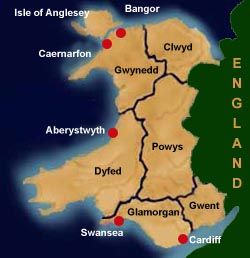 |
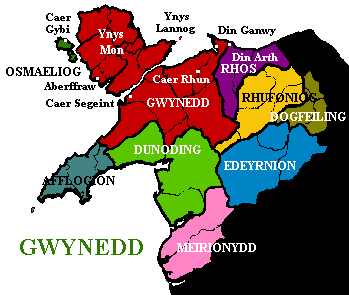 |
||||
| Old Kingdoms | Old Gwynedd |
Gwynedd is now a County in NW Wales, and Meirionydd is an electorate (Meirionydd Nant Conwy) district (Merionethshire) or a pre 1974 county (Merioneth).
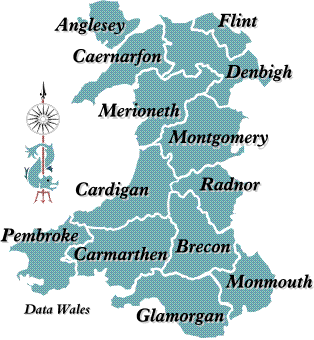 |
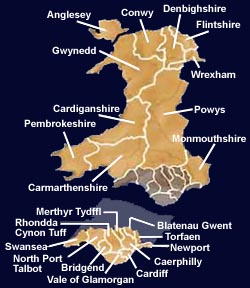 |
||||
| Pre 1974 Counties | Post 1996 Counties |
Bibliography
[1] Britannia.com www.britannia.com/bios/ebk/cadwamd.html
[1a] Britannia.com www.britannia.com/history/ebk/gene/cunedanc.html
[1b] Britannia.com www.britannia.com/bios/ebk/meircmmd.html
[1c] Britannia.com www.britannia.com/history/arthur/kabattles.html
[1c] Britannia.com www.britannia.com/bios/ebk/gwrinfmd.html
[1e] Britannia.com www.britannia.com/bios/ebk/brychbbg.html
[1f] Britannia.com www.britannia.com/history/arthur/caerleon.html
[1f] Britannia.com www.britannia.com/bios/ebk/cadwafgd.html
[2] Geoffrey of Monmouth "History of the Kings of Britain" (c.1100 BC-689 AD) in www.britannia.com/history/geofmon.html
[3] http://home.worldonline.dk/~kmariboe/fgspwelsh.html
[4] Early References to a Real Arthur www.britannia.com/history/arthur/karef.html
[5] Gilda's Account www.sci.gu.edu.au/~wiseman/DECB/DECBps.html
[6] Timeline www.sci.gu.edu.au/~wiseman/DECB/DECBbestest.html
[7] Timeline www.britannia.com/history/timearth.html
[8] Uther Pendragon www.mystical-www.co.uk/arthuriana2z/d.htm#DRAGON
[9] Phillips, G & Keatman, M "King Arthur: The True Story" Century 1992 ISBN 0 7126 5580 8
[10] Uther Pendragon www.mystical-www.co.uk/arthuriana2z/d.htm#DRAGON
[11] Baker, Mick "Celtic Britain: "Owain Ddantgwyn and the Identity of King Arthur" www.historyfiles.co.uk/FeaturesBritain/CymruOwain&Arthur.htm
[12] Baker, Mick "Celtic Britain: "Arthur Identified as Cadwaladr of Meirionydd" www.historyfiles.co.uk/FeaturesBritain/CymruArthurCadwaladr.htm
[13] Robert Brian Stewart Evans, GA. Our Family History -
[a] "Brenin Meirionydd Cadwaladr ap Meirchion o Meirionydd" http://homepages.rootsweb.com/~cousin/html/p302.htm#i18266
[b] "Brenin Meirionydd Gwrin Farfdrwch ap Cadwaladr o Meirionydd" http://homepages.rootsweb.com/~cousin/html/p302.htm#i18269
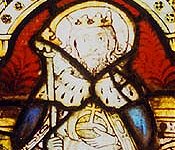
.png)
